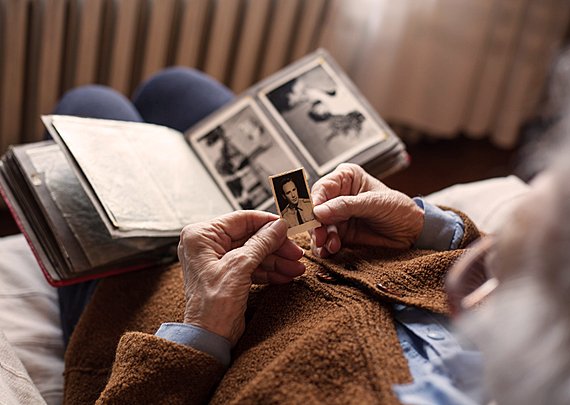192 Sloane Street, London SW1X 9QX

How Does Dementia Impact Someone's Sleep Pattern?
Dementia is a syndrome characterised by a progressive decline in cognitive function. It's a journey that is unique to each individual, and it can bring about a variety of changes as symptoms progress. This can include changes in a person’s sleep pattern. People living with dementia may sleep at unusual [EH1] times, find it more difficult to get to sleep, or experience restlessness during the night.
At KYN, we approach dementia care with understanding and empathy, recognising that they are part of the individual's journey with dementia. In this article, we delve into the relationship between dementia and sleep, and how we can support those experiencing changes in their sleep patterns.
Understanding Dementia and Sleep
There are many different forms of dementia, and each person living with dementia is unique. Each individual will experience varying cognitive, physical and psychological symptoms - no two journeys look the same. One area of a person’s life that may be affected by dementia is sleep. Sleep disturbances may present in many different ways for those living with dementia, such as:
- Insomnia: Difficulty falling asleep or staying asleep.
- Increased daytime sleepiness: Poor sleep quality can lead to feeling drowsy and napping during the day. This can create a vicious cycle, further disrupting the night-time sleep pattern.
- Nighttime walking: Confusion and disorientation can lead to a person getting up and walking around during the night. This not only disrupts sleep but can also be a safety concern.
- Changes in sleep architecture: This affects the time spent in different stages of sleep, potentially leading to fragmented and less refreshing sleep.
- Nighttime hallucinations or delusions: Some individuals with dementia might experience visual or auditory hallucinations or delusions at night, causing difficulty sleeping.
People living with dementia are also more likely to be diagnosed with certain sleep disorders, such as irregular sleep-wake rhythm disorder. This is characterised by a lack of a clear sleep-wake pattern, with sleep occurring in a series of naps spread across a 24-hour period.
The Science Behind Sleep and Dementia
Research suggests that the brain undergoes vital restorative processes during sleep. Dementia can disrupt these processes, leading to changes in sleep patterns. For example, parts of the brain that control when we feel alert or tired can become damaged in individuals living with dementia. The production of certain hormones, such as melatonin, can also be affected. This makes it hard for the body to keep a normal sleep pattern.
Sometimes, other health problems, such as restless legs or sleep apnoea (where breathing stops and starts during sleep), can also make sleep troubles worse for someone living with dementia. Additionally, people with dementia might feel increasingly anxious, confused or agitated in the evenings, making it hard to relax ready for sleep. This is sometimes called "sundowning." Noisy rooms, bright lights, unfamiliar surroundings, or even side effects from certain medicines can also contribute to disrupted sleep. Understanding what causes sleep problems in those living with dementia can help us to provide more effective dementia care, and support individuals’ unique needs with greater empathy.
Strategies to Support Sleep in Dementia
At KYN, we believe in a holistic approach to care. This includes creating a conducive environment for sleep, maintaining a regular schedule, and encouraging daytime activities to promote better sleep at night.
Creating a Conducive Environment for Sleep
A conducive environment for sleep is crucial in managing sleep changes for people living with dementia. This includes ensuring that the individual's room is comfortable and calming. Factors such as room temperature, lighting, and noise levels can all impact sleep quality. Using blackout blinds, for example, can help to create a soothing environment. At KYN, we pay attention to these details, creating a sleep environment that is conducive to rest and relaxation.
Maintaining a Regular Schedule
Maintaining a regular schedule can also help manage sleep changes associated with living with dementia. This includes regular times for meals, activities, and bedtime. A regular schedule can help regulate the body's internal clock, promoting better sleep at night. Where possible, those living with dementia should be encouraged to stay active during the day, both mentally and physically.
It can help to engage in soothing, relaxing activities in the evenings, such as reading or taking a warm bath. Limiting stimulants (e.g. caffeine and nicotine) in the hours before bed can also be beneficial. At KYN, we help establish and maintain regular schedules, providing a sense of structure and predictability that can be comforting to individuals living with dementia.
The Role of Medication
Medication can sometimes be used to manage sleep changes associated with living with dementia. However, it's not always the first line of approach. Medications can have side effects, and their effectiveness can vary from person to person.
At KYN, we take a holistic approach, incorporating both medical and non-medical treatments and strategies to help our residents manage their symptoms. We consult regularly with residents, their families and healthcare specialists to develop comprehensive care plans tailored to each individual’s unique needs.
The Importance of Caregiver Support
From trained carers to family members, caregivers play a crucial role in helping individuals with dementia manage their symptoms, including sleep changes. They are often the ones who observe these changes first hand and are instrumental in implementing strategies to support them.
At KYN, we recognise the important role that caregivers play, and we provide them with the support and education they need. We equip our care team with the tools and knowledge to manage sleep changes effectively, and we provide a supportive community where they can share their experiences and learn from others. – Something here about Admiral Nurses and how they can help?
The KYN Approach to Dementia Care
At KYN, we believe in personalised care. We understand that each individual's journey with dementia is unique, and we tailor our care to meet their specific needs and preferences. Our approach to caring for a person living with dementia includes specialised personal care and nursing care, all provided in a safe, supportive and comforting environment. We focus on understanding the individual, their life story, their likes and dislikes, and their dreams and aspirations.
This understanding forms the basis of our personalised care plans. We are committed to providing personalised care that respects and honours the individual's journey with dementia and supporting their loved ones in their journey. To find out more about our dementia care homes, contact KYN. Enquire today to request a brochure, call or visit.
Related

Join our next Open Day
Please provide your contact details below.
If you are interested in working at KYN, please kindly visit the Careers page. The Open Days listed above are for potential residents and their friends and families, not for recruitment.
Thank you
Thank you for your interest in KYN. We will be in touch with you very shortly.
If you require any assistance in the meantime, please email enquiries@kyn.co.uk or call +44 (0) 20 3535 1923.

